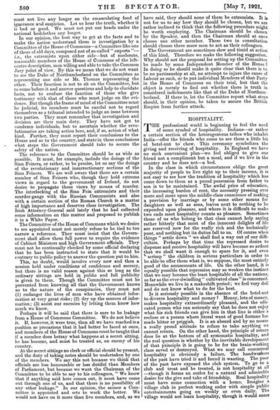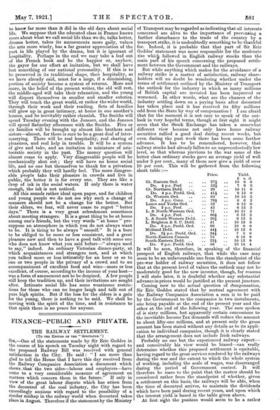HOSPITALITY.
T'professional world is beginning to feel the need of some symbol of hospitality. Indians—or rather a certain section of the heterogeneous tribes who inhabit India—offer the friends who come to see them a little bit of betel-nut to' chew. This ceremony symbolizes the giving and receiving of hospitality. In England we have no such convenient plan—we feel obliged to give our friend not a compliment but a meal, and if we live in the country and he does not—a bed. In the class in which circumstances oblige the great majority of people to live right up to their income, it is not easy to see how the tradition of hospitality which has come down to them as a proud possession from father to son is to be maintained. The awful price of education, the increasing burden of rent, the necessity pressing ever more and more upon the middle-class conscience of making a provision by • marriage or by some other means for daughters as well as sons, leaves next to nothing to be expended upon pleasure, and where it is difficult to make two ends meet hospitality counts as pleasure. Sometimes those of us who belong to that class cannot help saying rather bitterly that most of the innocent delights of life are reserved now for the really rich and the technically poor, and nothing but its duties fall to us. Of course when things " settle down " we shall find a way out of our diffi- culties. Perhaps by that time the repressed desire to dispense and receive hospitality will have become so ardent that we shall want it enough to spare for it, and even ' scrimp " the children in serious particulars in order to be able-to offer them what is, we suppose, the most entirely good of the amusements of life. On the other hand, it is equally possible that repression may so weaken the instinct that we may become the least hospitable of all the nations, so far as the ever-dwindling " cultivated class " is concerned. Meanwhile we live in a makeshift period; we feel very dull and do not know what to do for the best.
Is it seriously possible in the absence of the betel-nut to divorce hospitality and money ? Money, lots of money, makes hospitality extraordinarily pleasant, and the edu- cated person who can seriously say that he does not enjoy what his rich friends can give him in that line is either a recluse or a person whom literal want of good fortune has made bitter or prig; ish. It is an absurd and by no means a really proud attitude to refuse to take anything we cannot return. On the other hand, the principle of return does lie at the bottom of all systematic hospitality, and the real question is whether by the inevitable development of that principle it is going to be for the brain-working class saved or destroyed. What we may call communal hospitality is obviously a failure. The handworkers of the past have tried it and found it wanting. The poor of the past have exposed the club system. To go to a club and treat and be treated, is not hospitality at all —though it forms an outlet for a natural and admirable desire for the give and take of friendship. Real hospitality must have some connexion with a home. Imagine a village club in perfect working order with simple public entertainments going on weekly or even daily. ' The village would not learn hospitality, though it would come to know far more than it did in the old days about social life. We suppose that the educated class in France knows more about what we call social life than we do, talks better, dresses better, takes its amusements more gaily, values the arts more wisely, has a far greater appreciation of the part in life played by the drama, but it is ignorant of hospitality. Perhaps in the end we may take a leaf out of the. French book and be the happier or, anyhow, the gayer for our effort at imitation, but we shall have lost something of our national personality. If this is to be preserved in its traditional shape, then hospitality, as we have already said,. must for a large, if a diminishing, portion of society become a system of returns. More and more, in the belief of the present writer, the old will rest, the middle-aged will take their relaxation, and the young will disport themselves in smaller and smaller coteries. They will touch the great world, or rather the wider world, through their work and their reading. Sets of families will grow up in great intimacy, at home in one another's houses, and be inevitably rather clannish. The Smiths will spend Tuesday evening with the Joneses, and the Joneses will spend Saturday afternoon with the Smiths. Five or six families will be brought up almost like brothers and sisters—almost, for there is sure to be a great deal of inter- marrying. There will be real hospitality, real sharing of pleasures, and real help in trouble. It will be a system of give and take, and an imitation in miniature of aris- tocratic society in the past. The money question will almost cease to apply. Very disagreeable people will be mechanically shut out ; they will have no home social life, and no one but themselves to thank for a privation which probably they will hardly feel. The more disagree- able people take their pleasure in crowds and live in public, the better it is for every one. They are like a drop of ink in the social waters. If only there is water enough, the ink is not noticed. All this sounds rather ideal upon paper, and for children and young people we. do not see why such a change of manners should not be a change for the better. But their elders, we fear, will never cease to regret " better days." There is a very great refreshment sometimes about meeting strangers. It is a great thing to be at home among one's friends, but the very words " at home " pre- suppose an atmosphere in which you do not always want to be. It is tiring to be always " oneself." It is a bore to be obliged to be more or less consistent, and a great pleasure now and then to have a good talk with some one who does not know what you said before—" always used to say," indeed. An ordinary Victorian dinner-party, at which acquaintances and strangers met, and at which you talked more or less intimately for an hour or so to one or two people in the privacy of a crowd and to an accompaniment of excellent food and wine—more or less excellent, of course, according to the income of your host— was a form of amusement not to be despised. A few people still keep the tradition up, and their invitations are sought after. Intimate social life has some wearisome restric- tions for those who can no longer laugh and talk out of pure high spirits. But if the loss for the elders is a gain for the young, there is nothing to be said. We shall be moving with the spirit of the time, and in resistance to that spirit there is no peace for anyone.



































 Previous page
Previous page